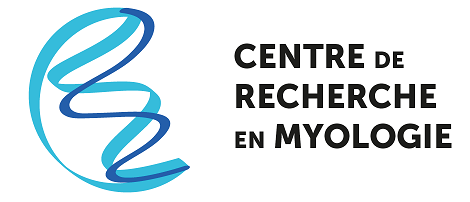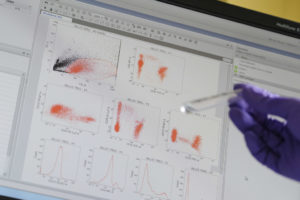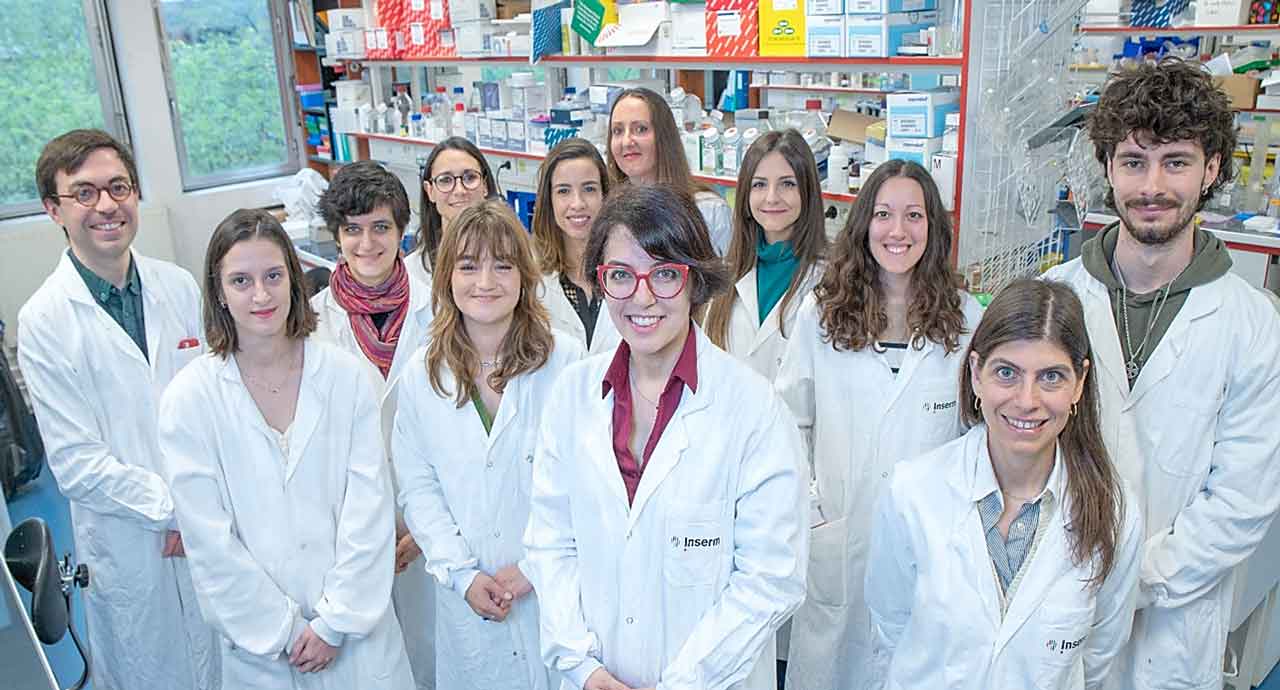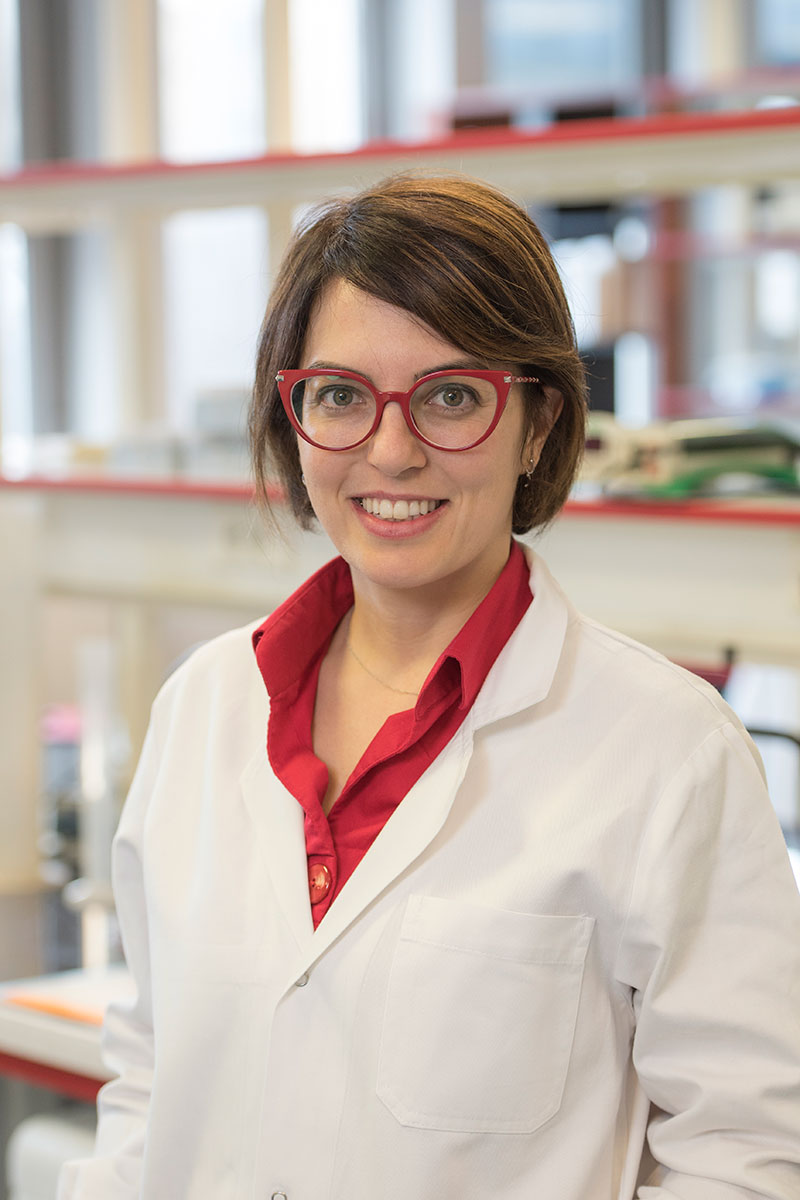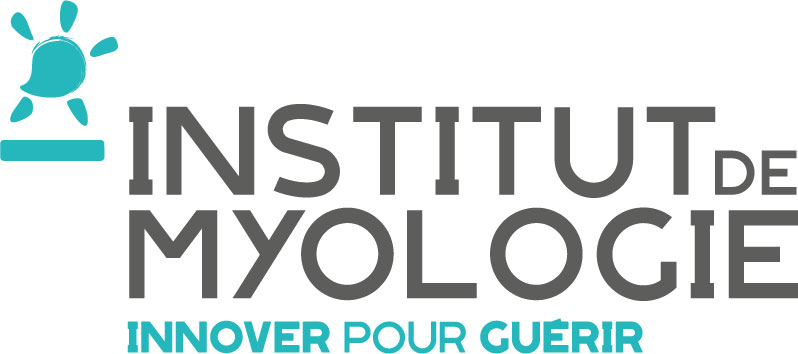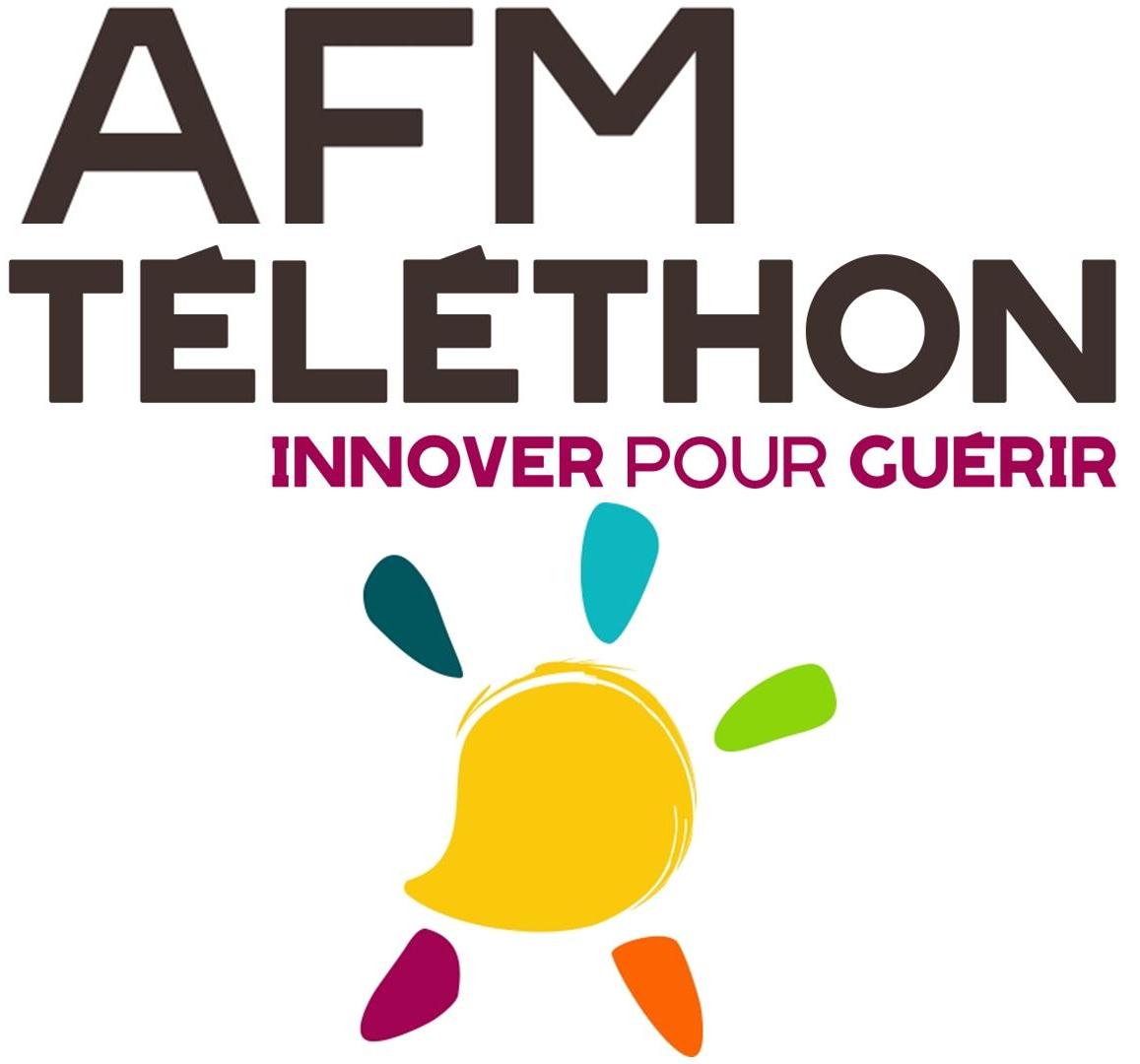Biotherapies for motor neuron disorders (ALS & SMA)
The team led by Dr. Piera Smeriglio at the Center of Research in Myology in Paris specializes in motor neuron disease research, with a strong focus on epigenetic regulation and the development of innovative gene therapies. This diverse and dedicated group of researchers, research assistants and PhD students is committed to translating scientific discoveries into clinical applications. Together, they actively contribute to advancing knowledge on amyotrophic lateral sclerosis (ALS) and spinal muscular atrophy (SMA) while training the next generation of scientists.
Dr. Piera Smeriglio, CRCN INSERM, a researcher at the Institute of Myology in Paris, leads a team of international researchers with diverse background, dedicated to studying motor neuron diseases. As an expert in DNA epigenetic regulation in neuromuscular pathologies, she uses state-of-the-art multi-omics technologies to identify new therapeutic targets. The prestigious EU Marie Curie fellowship she received in 2020 allowed her to jumpstart her research and subsequently led to the direction of her current research team. Since 2022, as a tenured researcher at INSERM, Dr. Smeriglio has been committed to translating scientific discoveries into clinical applications, fostering a close relationship between research and patient care. She also holds an HDR from Sorbonne and is involved in numerous international projects, including the international relationship program SU/Fiocruz (Brazil) and the EU Eudera consortium for rare diseases.
Hobbies: Piera loves sewing and creating clothes and accessories.
Dr. Fiorella Grandi, CRCN INSERM. In October 2022, Fiorella started a postdoc in the Epigenetics and Motor Neuron Biotherapies team, after earning her PhD at Stanford and completing a postdoc at the Gladstone Institutes. A 2022 MSCA fellowship laureate, she investigates the epigenetic mechanisms influencing the efficacy of gene therapy, focusing on motor neuron diseases like SMA. Passionate about her research, Fiorella is also invested in training students. Her commitment and research were recognized when she secured a position as CR INSERM in 2024.
Hobbies: Fiorella loves hiking and having fun with her adorable dog Bella.
Dr. Julia Lemos, postdoctoral researcher, holding a PhD in cellular and molecular biology with a specialization in immunology (2018, FIOCRUZ-RJ), Julia studied immune alterations in various diseases such as type 1 diabetes and the Zika virus infections. After a postdoc at the Saint Louis Research Institute on cellular interactions in the bone marrow, she joined the Myology Research Center in June 2021, focusing on the role of the thymus in ALS.
Hobbies: Julia is particularly interested in reading, music and cinema, as well as podcasts on different topics and sport.
Stéphanie Astord, AIM research engineer. Since 2007, Stéphanie has developed extensive expertise on ALS and SMA, contributing to the development of innovative gene therapies. For several years, she has also been involved in the production of recombinant AAV vectors, essential for therapeutic strategies. She is also actively involved in the lab’s management.
Hobbies: Stéphanie is creative by nature: among watercolor drawing and sewing, she loves creating for herself and others!
Mathilde Cohen-Tannoudji, AIM research engineer. After joining the Center in 2012, Mathilde focuses on the development of gene therapies for ALS, dedicating effort to the AAV production optimization in order to achieve highly concentrated viral preparation, crucial for therapeutic efficacy. Her creative personality helps the team find original solutions to both technical and scientific challenges, driving the group toward new adventures.
Hobbies: Always on the lookout for new and inventive solutions, Mathilde loves to paint and decorate walls, offices and common rooms in the lab!
Sonia Pezet, AIM research engineer. After obtaining a Master’s degree in Human Toxicology from the University of Paris Descartes in 2013, Sonia worked for four years at the Cochin Institute on inflammatory rheumatism and systemic diseases. Since 2019, at the Myology Research Center, she has focused mainly on bio-experimentation for the development of gene therapies for ALS, a critical role that demands great rigor. She has been in a permanent position since the end of 2023 and plays a key role in advancing gene therapy research.
Hobbies: Sonia is an expert dancer and trapeze artist, and enjoys making and editing short films.
Sabrina Mazzucchi, PhD student. During her Master’s at the University of Milano-Bicocca, Sabrina completed a one-year internship at the Mario Negri Institute, working on the behavioral, neuropathological, and biomolecular characterization of a C9orf72 KO mouse model, one of the genes involved in ALS. In 2021, through an Erasmus+ program, she joined Piera Smeriglio’s team to study epigenetic modifications related to SMA. Since 2023, she has been pursuing her research as a PhD student.
Hobbies: after adopting a naughty puppy, Sabrina spends her free time running around Parisian parks with him.
Alice Arnould, PhD student. In 2022, Alice completed her Master’s project in Piera Smeriglio’s lab on the epigenetic response to AAV9-SMN1 gene therapy for SMA. Her work included analyzing chromatin modifications and the methylation of the AAV9 transgene. Alice is now continuing this research as a PhD student.
Hobbies: passionate about the Brazilian culture and traditions, Alice is an exceptional capoeira artist.
Elena Gidaja, PhD student, Elena completed her Master’s internship in 2021 at the University of Rome “La Sapienza,” where she studied the role of extracellular vesicles in the liver-muscle axis associated with sarcopenia linked to alcoholic liver disease. In 2023, during her Erasmus+ internship under the supervision of Piera Smeriglio, she investigated the role of SMN1 in myoblast development. She also began collecting data for her PhD project, which started in October 2024, on the systemic impact of EVs production in SMA.
Hobbies: Elèna loves cooking ( and eating good food!) and she dedicate some of her free time to DIY activities.
Matteo Ernu, assistant engineer, joined the group in January 2024 to provide technical support for various research projects. Matteo actively participates in managing in vivo mouse lines, genotyping, sample extractions, biochemical analyses, and AAV vector production.
Hobbies: Matteo loves music. Singing and playing instruments are his favorite activities.
Marina Colella is an Italian pediatrician specializing in neonatal intensive care, fascinated by brain development and neurodevelopmental research. Her PhD focused on the impact of inflammation on white matter development, particularly in premature infants. Her passion for research led her to explore the connection between the brain and muscles, and she now works at the heart of a clinical research center.
Hobbies: When she’s not diving into clinical trials, she enjoys adventurous travels or harvesting grapes to produce natural wines.
Gorka Fernández-Eulate is a neurologist in the reference center for neuromuscular diseases at Pitié-Salpêtrière Hospital in Paris with an interest in both neuromuscular and neurometabolic disorders. He is currently in his last year of PhD, carrying out a project to better understand the mechanisms and causes of motor neuron degeneration in lysosomal storage disorders.
Hobbies: Gorka plays the violin and enjoys both listening to and playing in amateur orchestras in the Ile-de-France region!
Contacts :
| Name | Position | ORCID | Group |
|---|
Journal articles
- Amélie Vergnol, Aly Bourguiba, Stephanie Bauché, Massiré Traoré, Maxime Gelin, et al.. Identification of CaVβ1 Isoforms Required for Neuromuscular Junction Formation and Maintenance. Cells, 2025, 14 (15), pp.1210. ⟨10.3390/cells14151210⟩. ⟨hal-05337131⟩
- Marius Halliez, Steve Cottin, Axel You, Céline Buon, Antony Grondin, et al.. MuSK cysteine-rich domain antibodies are pathogenic in a mouse model of autoimmune myasthenia gravis. The Journal of clinical investigation, 2025, 135, ⟨10.1172/jci173308⟩. ⟨hal-05344474⟩
- Anna Underhill, Samuel Webb, Fiorella Grandi, Jing-Yi Jeng, Jacques de Monvel, et al.. MYO7A is required for the functional integrity of the mechanoelectrical transduction complex in hair cells of the adult cochlea. Proceedings of the National Academy of Sciences of the United States of America, 2025, 122 (1), pp.e2414707122. ⟨10.1073/pnas.2414707122⟩. ⟨hal-04905455⟩
- Fiorella Carla Grandi, Stéphanie Astord, Sonia Pezet, Elèna Gidaja, Sabrina Mazzucchi, et al.. Characterization of SMA type II skeletal muscle from treated patients shows OXPHOS deficiency and denervation. JCI Insight, 2024, 9 (20), pp.e180992. ⟨10.1172/jci.insight.180992⟩. ⟨hal-04750849⟩
- Julia Pereira Lemos, Liliane Patrícia Gonçalves Tenório, Vincent Mouly, Gillian Butler-Browne, Daniella Arêas Mendes-Da-Cruz, et al.. T cell biology in neuromuscular disorders: a focus on Duchenne Muscular Dystrophy and Amyotrophic Lateral Sclerosis. Frontiers in Immunology, 2023, 14, pp.120283. ⟨10.3389/fimmu.2023.1202834⟩. ⟨hal-04603915⟩
- Piera Smeriglio, Antoine Zalc. Cranial Neural Crest Cells Contribution to Craniofacial Bone Development and Regeneration. Current Osteoporosis Reports, 2023, 21 (5), pp.624-631. ⟨10.1007/s11914-023-00804-8⟩. ⟨hal-05048451⟩
- Piera Smeriglio, Antoine Zalc. Cranial neural crest cells contribution to craniofacial bone development and regeneration. Current Osteoporosis Reports, 2023, 21 (5), pp.624-631. ⟨10.1007/s11914-023-00804-8⟩. ⟨hal-04166947⟩
- Amédée Mollard, Cécile Peccate, Anne Forand, Julie Chassagne, Laura Julien, et al.. Muscle regeneration affects Adeno Associated Virus 1 mediated transgene transcription. Scientific Reports, 2022, 12 (1), pp.9674. ⟨10.1038/s41598-022-13405-9⟩. ⟨hal-03828271⟩
- Clément Pontoizeau, Marcelo Simon-Sola, Clovis Gaborit, Vincent Nguyen, Irina Rotaru, et al.. Neonatal gene therapy achieves sustained disease rescue of maple syrup urine disease in mice. Nature Communications, 2022, 13 (1), pp.3278. ⟨10.1038/s41467-022-30880-w⟩. ⟨hal-03862521⟩
- Ugo Carraro, Frank Bittmann, Elena Ivanova, Halldór Jónsson Jr, Helmut Kern, et al.. Post-meeting report of the 2022 On-site Padua Days on Muscle and Mobility Medicine, March 30 - April 3, 2022, Padua, Italy. European Journal of Translational Myology, 2022, 32 (2), ⟨10.4081/ejtm.2022.10521⟩. ⟨hal-03815564⟩
- Fiorella Grandi, Hailey Modi, Lucas Kampman, M. Ryan Corces. Chromatin accessibility profiling by ATAC-seq. Nature Protocols, 2022, 17 (6), pp.1518-1552. ⟨10.1038/s41596-022-00692-9⟩. ⟨hal-04198919⟩
- Alice Frerot, Véronique Baudouin, Aline Rideau-Batista, Anne Couderc, Catherine Garel, et al.. Prenatal bone abnormalities in three cases of familial hypocalciuric hypercalcemia. Prenatal Diagnosis, 2022, 42 (5), pp.583-588. ⟨10.1002/pd.6134⟩. ⟨hal-03971189⟩
- Marina Colella, Isabella Panfoli, Matteo Doglio, Michela Cassanello, Maurizio Bruschi, et al.. Adenosine Blood Level: A Biomarker of White Matter Damage in Very Low Birth Weight Infants. Current Pediatric Reviews, 2022, 18 (2), pp.153-163. ⟨10.2174/1573396318666220127155943⟩. ⟨hal-03971247⟩
- Michela Bruschi, Neety Sahu, Mamta Singla, Fiorella Grandi, Pranay Agarwal, et al.. A Quick and Efficient Method for the Generation of Immunomodulatory Mesenchymal Stromal Cell from Human Induced Pluripotent Stem Cell. Tissue Engineering: Parts A, B, and C, 2022, 28 (9-10), pp.433-446. ⟨10.1089/ten.TEA.2021.0172⟩. ⟨hal-04198911⟩
- Michela Lisjak, Alessia de Caneva, Thibaut Marais, Elena Barbon, Maria Grazia Biferi, et al.. Promoterless Gene Targeting Approach Combined to CRISPR/Cas9 Efficiently Corrects Hemophilia B Phenotype in Neonatal Mice. Frontiers in Genome Editing, 2022, 4, ⟨10.3389/fgeed.2022.785698⟩. ⟨hal-03862537⟩
- Coralie Hakibilen, Florence Delort, Marie-Thérèse Daher, Pierre Joanne, Eva Cabet, et al.. Desmin Modulates Muscle Cell Adhesion and Migration. Frontiers in Cell and Developmental Biology, 2022, 10, ⟨10.3389/fcell.2022.783724⟩. ⟨hal-03876281⟩
- Valentin Jacquier, Manon Prévot, Thierry Gostan, Rémy Bordonné, Sofia Benkhelifa-Ziyyat, et al.. Splicing efficiency of minor introns in a mouse model of SMA predominantly depends on their branchpoint sequence and can involve the contribution of major spliceosome components. RNA, 2022, 28 (3), pp.303-319. ⟨10.1261/rna.078329.120⟩. ⟨hal-03687098⟩
- Giorgia Querin, Maria Grazia Biferi, Pierre-Francois Pradat. Biomarkers for C9orf7-ALS in Symptomatic and Pre-symptomatic Patients: State-of-the-art in the New Era of Clinical Trials. Journal of Neuromuscular Diseases, 2022, 9 (1), pp.25-37. ⟨10.3233/JND-210754⟩. ⟨hal-03538900⟩
- Pranay Agarwal, Hong-Pyo Lee, Piera Smeriglio, Fiorella Grandi, Stuart Goodman, et al.. A dysfunctional TRPV4–GSK3β pathway prevents osteoarthritic chondrocytes from sensing changes in extracellular matrix viscoelasticity. Nature Biomedical Engineering, 2021, 5 (12), pp.1472-1484. ⟨10.1038/s41551-021-00691-3⟩. ⟨hal-03815571⟩
- Manuela Zinni, Julien Pansiot, Marina Colella, Valérie Faivre, Andrée Delahaye-Duriez, et al.. Impact of Fetal Growth Restriction on the Neonatal Microglial Proteome in the Rat. Nutrients, 2021, 13 (11), pp.3719. ⟨10.3390/nu13113719⟩. ⟨hal-03971304⟩
- Fiorella Carla Grandi, Nidhi Bhutani. Mapping 5-Hydroxymethylcytosine (5hmC) Modifications in Skeletal Tissues Using High-Throughput Sequencing. Methods in Molecular Biology, 2021, Methods in Molecular Biology, 2221, pp.101-108. ⟨10.1007/978-1-0716-0989-7_8⟩. ⟨hal-04198967⟩
- Stephanie Holden, Fiorella Grandi, Oumaima Aboubakr, Bryan Higashikubo, Frances Cho, et al.. Complement factor C1q mediates sleep spindle loss and epileptic spikes after mild brain injury. Science, 2021, 373 (6560), ⟨10.1126/science.abj2685⟩. ⟨hal-04198976⟩
- Nicolas Vignier, Maria Chatzifrangkeskou, Luca Pinton, Hugo Wioland, Thibaut Marais, et al.. The non-muscle ADF/cofilin-1 controls sarcomeric actin filament integrity and force production in striated muscle laminopathies. Cell Reports, 2021, 36 (8), pp.109601. ⟨10.1016/j.celrep.2021.109601⟩. ⟨hal-03350074⟩
- Muhammad Farooq Rai, Chia-Lung Wu, Terence Capellini, Farshid Guilak, Amanda Dicks, et al.. Single Cell Omics for Musculoskeletal Research. Current Osteoporosis Reports, 2021, 19 (2), pp.131-140. ⟨10.1007/s11914-021-00662-2⟩. ⟨hal-04199024⟩
- Neety Sahu, Pranay Agarwal, Fiorella Grandi, Michela Bruschi, Stuart Goodman, et al.. Encapsulated Mesenchymal Stromal Cell Microbeads Promote Endogenous Regeneration of Osteoarthritic Cartilage Ex Vivo. Advanced Healthcare Materials, 2021, 10 (8), ⟨10.1002/adhm.202002118⟩. ⟨hal-04199033⟩
- Maria Grazia Biferi, Mathilde Cohen-Tannoudji, Andrea García-Silva, Olga Souto-Rodríguez, Irene Viéitez-González, et al.. Systemic Treatment of Fabry Disease Using a Novel AAV9 Vector Expressing α-Galactosidase A. Molecular Therapy - Methods and Clinical Development, 2021, 20, pp.1 - 17. ⟨10.1016/j.omtm.2020.10.016⟩. ⟨hal-03193801⟩
- Marisa Cappella, Sahar Elouej, Maria Grazia Biferi. The Potential of Induced Pluripotent Stem Cells to Test Gene Therapy Approaches for Neuromuscular and Motor Neuron Disorders. Frontiers in Cell and Developmental Biology, 2021, 9, pp.62837. ⟨10.3389/fcell.2021.662837⟩. ⟨hal-03217251⟩
- Fiorella Grandi, Nidhi Bhutani. Preparation of Human Chondrocytes for Profiling Using Cytometry by Time-of-flight (cyTOF). Bio-protocol , 2021, 11 (14), ⟨10.21769/BioProtoc.4086⟩. ⟨hal-04198950⟩
- Giorgia Querin, Timothée Timothée Lenglet, Rabab Debs, Tanya Stojkovic, Anthony Behin, et al.. Development of new outcome measures for adult SMA type III and IV: a multimodal longitudinal study. Journal of Neurology, 2021, 268 (5), pp.1792-1802. ⟨10.1007/s00415-020-10332-5⟩. ⟨hal-03230903⟩
- Marisa Cappella, Pierre-François Pradat, Giorgia Querin, Maria Grazia Biferi. Beyond the Traditional Clinical Trials for Amyotrophic Lateral Sclerosis and The Future Impact of Gene Therapy. Journal of Neuromuscular Diseases, 2021, 8 (1), pp.25 - 38. ⟨10.3233/jnd-200531⟩. ⟨hal-03346426⟩
- Pasqualina Colella, Pauline Sellier, Manuel J Gomez, Maria G Biferi, Guillaume Tanniou, et al.. Gene therapy with secreted acid alpha-glucosidase rescues Pompe disease in a novel mouse model with early-onset spinal cord and respiratory defects. EBioMedicine, 2020, 61, pp.103052. ⟨10.1016/j.ebiom.2020.103052⟩. ⟨hal-03163331⟩
- Aurore Besse, Stephanie Astord, Thibaut Marais, Marianne Roda, Benoit Giroux, et al.. AAV9-Mediated Expression of SMN Restricted to Neurons Does Not Rescue the Spinal Muscular Atrophy Phenotype in Mice. Molecular Therapy, 2020, 28 (8), pp.1887-1901. ⟨10.1016/j.ymthe.2020.05.011⟩. ⟨inserm-03130706⟩
- Piera Smeriglio, Fiorella Carla Grandi, Sarah Elizabeth Brook Taylor, Antoine Zalc, Nidhi Bhutani. TET1 Directs Chondrogenic Differentiation by Regulating SOX9 Dependent Activation of Col2a1 and Acan In Vitro. JBMR Plus, 2020, 4 (8), ⟨10.1002/jbm4.10383⟩. ⟨hal-03815584⟩
- Fiorella Carla Grandi, Nidhi Bhutani. Epigenetic Therapies for Osteoarthritis. Trends in Pharmacological Sciences, 2020, 41 (8), pp.557-569. ⟨10.1016/j.tips.2020.05.008⟩. ⟨hal-04199045⟩
- Blanca Morales Rodriguez, Alejandro Domínguez-Rodríguez, Jean-Pierre Benitah, Florence Lefebvre, Thibaut Marais, et al.. Activation of sarcolipin expression and altered calcium cycling in LMNA cardiomyopathy. Biochemistry and Biophysics Reports, 2020, 22, pp.100767. ⟨10.1016/j.bbrep.2020.100767⟩. ⟨hal-03269952⟩
- Fiorella Carla Grandi, Lara de Tomasi, Mirna Mustapha. Single-Cell RNA Analysis of Type I Spiral Ganglion Neurons Reveals a Lmx1a Population in the Cochlea. Frontiers in Molecular Neuroscience, 2020, 13, ⟨10.3389/fnmol.2020.00083⟩. ⟨hal-04199052⟩
- Piera Smeriglio, Fiorella Grandi, Spoorthi Davala, Venkata Masarapu, Pier Francesco Indelli, et al.. Inhibition of TET1 prevents the development of osteoarthritis and reveals the 5hmC landscape that orchestrates pathogenesis. Science Translational Medicine, 2020, 12 (539), ⟨10.1126/scitranslmed.aax2332⟩. ⟨hal-03815589⟩
- Anne-Laure Virlouvet, Julien Pansiot, Artemis Toumazi, Marina Colella, Andreas Capewell, et al.. In-line filtration in very preterm neonates: a randomized controlled trial. Scientific Reports, 2020, 10 (1), pp.5003. ⟨10.1038/s41598-020-61815-4⟩. ⟨inserm-02536737⟩
- Fiorella Carla Grandi, Reema Baskar, Piera Smeriglio, Shravani Murkherjee, Pier Francesco Indelli, et al.. Single-cell mass cytometry reveals cross-talk between inflammation-dampening and inflammation-amplifying cells in osteoarthritic cartilage. Science Advances , 2020, 6 (11), ⟨10.1126/sciadv.aay5352⟩. ⟨hal-03815549⟩
- Martine Barkats. SMA: from gene discovery to gene therapy. Médecine/Sciences, 2020, 36 (2), pp.137-140. ⟨10.1051/medsci/2020010⟩. ⟨hal-02519519⟩
- Piera Smeriglio, Paul Langard, Giorgia Querin, Maria Grazia Biferi. The Identification of Novel Biomarkers Is Required to Improve Adult SMA Patient Stratification, Diagnosis and Treatment. Journal of Personalized Medicine, 2020, 10 (3), pp.75. ⟨10.3390/jpm10030075⟩. ⟨hal-02986776⟩
- Inger Lauritzen, Anaïs Bécot, Alexandre Bourgeois, Raphaëlle Pardossi-Piquard, Maria-Grazia Biferi, et al.. Targeting γ-secretase triggers the selective enrichment of oligomeric APP-CTFs in brain extracellular vesicles from Alzheimer cell and mouse models. Translational Neurodegeneration, 2019, 8, ⟨10.1186/s40035-019-0176-6⟩. ⟨hal-03001500⟩
- Alice Frerot, Olivier Baud, Marina Colella, Ludmia Taibi, Stéphane Bonacorsi, et al.. Cord blood procalcitonin level and early-onset sepsis in extremely preterm infants. European Journal of Clinical Microbiology and Infectious Diseases, 2019, 38 (9), pp.1651-1657. ⟨10.1007/s10096-019-03593-0⟩. ⟨hal-03971313⟩
- Piera Smeriglio, Felix Wangsawihardja, Rose Leu, Mirna Mustapha. TSP1 and TSP2 Have Unique and Overlapping Roles in Protecting against Noise-Induced Auditory Synaptopathy. Neuroscience, 2019, 408, pp.68-80. ⟨10.1016/j.neuroscience.2019.03.036⟩. ⟨hal-03815591⟩
- Jake Mooney, Robert Manasherob, Piera Smeriglio, Nidhi Bhutani, Derek Amanatullah. Effect of trabecular metal on the elution of gentamicin from Palacos cement. Journal of Orthopaedic Research, 2019, 37 (5), pp.1018-1024. ⟨10.1002/jor.24274⟩. ⟨hal-03816391⟩
- Valérie Biran, Fabrice Decobert, Nathalie Bednarek, Priscilla Boizeau, Jean-François Benoist, et al.. Melatonin Levels in Preterm and Term Infants and Their Mothers. International Journal of Molecular Sciences, 2019, 20 (9), pp.2077. ⟨10.3390/ijms20092077⟩. ⟨hal-03971379⟩
- Marisa Cappella, Chiara Ciotti, Mathilde Cohen-Tannoudji, Maria Grazia Biferi. Gene Therapy for ALS—A Perspective. International Journal of Molecular Sciences, 2019, 20 (18), pp.4388. ⟨10.3390/ijms20184388⟩. ⟨hal-02343415⟩
- S. Le Quellec, A. P. Dane, E. Barbon, J. C. Bordet, F. Mingozzi, et al.. Recombinant Adeno-Associated Viral Vectors Expressing Human Coagulation FIX-E456H Variant in Hemophilia B Mice. Thromb Haemost, 2019, 119, pp.1956-1967. ⟨10.1055/s-0039-1697658⟩. ⟨hal-02880804⟩
- Marina Colella, Alice Frérot, Aline Rideau Batista Novais, Olivier Baud. Neonatal and Long-Term Consequences of Fetal Growth Restriction. Current Pediatric Reviews, 2018, 14 (4), pp.212-218. ⟨10.2174/1573396314666180712114531⟩. ⟨hal-03971449⟩
- Marina Colella, Manuela Zinni, Julien Pansiot, Michela Cassanello, Jérôme Mairesse, et al.. Modulation of Microglial Activation by Adenosine A2a Receptor in Animal Models of Perinatal Brain Injury. Frontiers in Neurology, 2018, 9, pp.605. ⟨10.3389/fneur.2018.00605⟩. ⟨hal-03971390⟩
- Maria Chatzifrangkeskou, David Yadin, Thibaut Marais, Solenne Chardonnet, Mathilde Cohen-Tannoudji, et al.. Cofilin-1 phosphorylation catalyzed by ERK1/2 alters cardiac actin dynamics in dilated cardiomyopathy caused by lamin A/C gene mutation. Human Molecular Genetics, 2018, 27 (17), pp.3060-3078. ⟨10.1093/hmg/ddy215⟩. ⟨hal-01962065⟩
- Manuela Zinni, Marina Colella, Aline Rideau Batista Novais, Olivier Baud, Jérôme Mairesse. Modulating the Oxytocin System During the Perinatal Period: A New Strategy for Neuroprotection of the Immature Brain?. Frontiers in Neurology, 2018, 9, pp.229. ⟨10.3389/fneur.2018.00229⟩. ⟨hal-03971408⟩
- Natalia Niemir, Laura Rouvière, Aurore Besse, Marie Vanier, Jasmin Dmytrus, et al.. Intravenous administration of scAAV9-Hexb normalizes lifespan and prevents pathology in Sandhoff disease mice. Human Molecular Genetics, 2018, 27 (6), pp.954-968. ⟨10.1093/hmg/ddy012⟩. ⟨hal-03862562⟩
- Thomas Goiran, Eric Duplan, Mounia Chami, Alexandre Bourgeois, Wejdane El Manaa, et al.. β-Amyloid Precursor Protein Intracellular Domain Controls Mitochondrial Function by Modulating Phosphatase and Tensin Homolog–Induced Kinase 1 Transcription in Cells and in Alzheimer Mice Models. Biological Psychiatry, 2018, 83 (5), pp.416-427. ⟨10.1016/j.biopsych.2017.04.011⟩. ⟨hal-02360864⟩
- Jieun Lee, Piera Smeriglio, Constance Chu, Nidhi Bhutani. Human iPSC-derived chondrocytes mimic juvenile chondrocyte function for the dual advantage of increased proliferation and resistance to IL-1β. Current Stem Cell Research & Therapy, 2017, 8 (1), pp.244. ⟨10.1186/s13287-017-0696-x⟩. ⟨hal-03818865⟩
- F. Puzzo, P. Colella, M. G. Biferi, D. Bali, N. K. Paulk, et al.. Rescue of Pompe disease in mice by AAV-mediated liver delivery of secretable acid alpha-glucosidase. Science Translational Medicine, 2017, 9 (418), pp.aam6375. ⟨10.1126/scitranslmed.aam6375⟩. ⟨hal-02881011⟩
- Piera Smeriglio, Jieun Lee, Nidhi Bhutani. Soluble Collagen VI treatment enhances mesenchymal stem cells expansion for engineering cartilage. Bioengineering & Translational Medicine, 2017, 2 (3), pp.278-284. ⟨10.1002/btm2.10078⟩. ⟨hal-03818854⟩
- Maria Grazia Biferi, Mathilde Cohen-Tannoudji, Ambra Cappelletto, Benoit Giroux, Marianne Roda, et al.. A New AAV10-U7-Mediated Gene Therapy Prolongs Survival and Restores Function in an ALS Mouse Model. Molecular Therapy, 2017, 25 (9), pp.2038-2052. ⟨10.1016/j.ymthe.2017.05.017⟩. ⟨hal-03829068⟩
- Simon Newkirk, Suman Lee, Fiorella Grandi, Valeriya Gaysinskaya, James Rosser, et al.. Intact piRNA pathway prevents L1 mobilization in male meiosis. Proceedings of the National Academy of Sciences of the United States of America, 2017, 114 (28), ⟨10.1073/pnas.1701069114⟩. ⟨hal-04199075⟩
- Valerie Matagne, Yann Ehinger, Lydia Saidi, Ana Borges-Correia, Martine Barkats, et al.. A codon-optimized Mecp2 transgene corrects breathing deficits and improves survival in a mouse model of Rett syndrome. Neurobiology of Disease, 2017, 99, ⟨10.1016/j.nbd.2016.12.009⟩. ⟨hal-01426386⟩
- Anne-Sophie Gribling-Burrer, Michael Leichter, Laurence Wurth, Alexandra Huttin, Florence Schlotter, et al.. SECIS-binding protein 2 interacts with the SMN complex and the methylosome for selenoprotein mRNP assembly and translation. Nucleic Acids Research, 2017, 45 (9), pp.5399-5413. ⟨10.1093/nar/gkx031⟩. ⟨hal-01541890⟩
- Jieun Lee, Piera Smeriglio, Jason Dragoo, William Maloney, Nidhi Bhutani. CD24 enrichment protects while its loss increases susceptibility of juvenile chondrocytes towards inflammation. Arthritis Research & Therapy, 2016, 18 (1), pp.292. ⟨10.1186/s13075-016-1183-y⟩. ⟨hal-03818872⟩
- Nadine Dragin, Jacky Bismuth, Géraldine Cizeron-Clairac, Maria Grazia Biferi, Claire Berthault, et al.. Estrogen-mediated downregulation of AIRE influences sexual dimorphism in autoimmune diseases.. Journal of Clinical Investigation, 2016, 126 (4), pp.1525-37. ⟨10.1172/JCI81894⟩. ⟨hal-01310502⟩
- Piera Smeriglio, Sonia Alonso-Martin, Silvia Masciarelli, Luca Madaro, Ilaria Iosue, et al.. Phosphotyrosine phosphatase inhibitor bisperoxovanadium endows myogenic cells with enhanced muscle stem cell functions via epigenetic modulation of Sca-1 and Pw1 promoters. FASEB Journal, 2016, 30 (4), pp.1404-1415. ⟨10.1096/fj.15-275420⟩. ⟨hal-01515295⟩
- Sarah E.B. Taylor, Jieun Lee, Piera Smeriglio, Adnan Razzaque, Robert Smith, et al.. Identification of Human Juvenile Chondrocyte-Specific Factors that Stimulate Stem Cell Growth. Tissue Engineering: Parts A, B, and C, 2016, 22 (7-8), pp.645-653. ⟨10.1089/ten.TEA.2015.0366⟩. ⟨hal-03818896⟩
- Sarah Eb Taylor, Ye Henry Li, Piera Smeriglio, Madhusikta Rath, Wing Wong, et al.. Stable 5-Hydroxymethylcytosine (5hmC) Acquisition Marks Gene Activation During Chondrogenic Differentiation. Journal of Bone and Mineral Research, 2016, 31 (3), pp.524-534. ⟨10.1002/jbmr.2711⟩. ⟨hal-03818918⟩
- Jieun Lee, Sarah Taylor, Piera Smeriglio, Janice Lai, William Maloney, et al.. Early induction of a prechondrogenic population allows efficient generation of stable chondrocytes from human induced pluripotent stem cells. FASEB Journal, 2015, 29 (8), pp.3399-3410. ⟨10.1096/fj.14-269720⟩. ⟨hal-03818924⟩
- Yannick Tanguy, Maria Biferi, Aurore Besse, Stephanie Astord, Mathilde Cohen-Tannoudji, et al.. Systemic AAVrh10 provides higher transgene expression than AAV9 in the brain and the spinal cord of neonatal mice. Frontiers in Molecular Neuroscience, 2015, 8, ⟨10.3389/fnmol.2015.00036⟩. ⟨hal-03829252⟩
- Piera Smeriglio, Lakshmi Dhulipala, Janice Lai, Stuart Goodman, Jason Dragoo, et al.. Collagen VI Enhances Cartilage Tissue Generation by Stimulating Chondrocyte Proliferation. Tissue Engineering: Parts A, B, and C, 2015, 21 (3-4), pp.840-849. ⟨10.1089/ten.TEA.2014.0375⟩. ⟨hal-03818937⟩
- Piera Smeriglio, Janice Lai, Fan Yang, Nidhi Bhutani. 3D Hydrogel Scaffolds for Articular Chondrocyte Culture and Cartilage Generation. Journal of visualized experiments : JoVE, 2015, 104, ⟨10.3791/53085⟩. ⟨hal-03818902⟩
- Piera Smeriglio, Janice Lai, Lakshmi Dhulipala, Anthony Behn, Stuart Goodman, et al.. Comparative Potential of Juvenile and Adult Human Articular Chondrocytes for Cartilage Tissue Formation in Three-Dimensional Biomimetic Hydrogels. Tissue Engineering: Parts A, B, and C, 2015, 21 (1-2), pp.147-155. ⟨10.1089/ten.TEA.2014.0070⟩. ⟨hal-03818946⟩
- Giulia Maria Camerino, Marina Bouchè, Michela de Bellis, Maria Cannone, Antonella Liantonio, et al.. Protein kinase C theta (PKCθ) modulates the ClC-1 chloride channel activity and skeletal muscle phenotype: a biophysical and gene expression study in mouse models lacking the PKCθ. Pflügers Archiv European Journal of Physiology, 2014, 466 (12), pp.2215-2228. ⟨10.1007/s00424-014-1495-1⟩. ⟨hal-03818950⟩
- Sarah Taylor, Piera Smeriglio, Lakshmi Dhulipala, Madhusikta Rath, Nidhi Bhutani. A Global Increase in 5-Hydroxymethylcytosine Levels Marks Osteoarthritic Chondrocytes. Arthritis & rheumatology, 2014, 66 (1), pp.90-100. ⟨10.1002/art.38200⟩. ⟨hal-03818959⟩
- Vanessa Besson, Piera Smeriglio, Amélie Wegener, Frédéric Relaix, Brahim Nait Oumesmar, et al.. PW1 gene/paternally expressed gene 3 (PW1/Peg3) identifies multiple adult stem and progenitor cell populations. Proceedings of the National Academy of Sciences of the United States of America, 2011, 108 (28), pp.11470-11475. ⟨10.1073/pnas.1103873108⟩. ⟨hal-03818968⟩
- Luca Madaro, Valeria Marrocco, Piera Fiore, Paola Aulino, Piera Smeriglio, et al.. PKCθ signaling is required for myoblast fusion by regulating the expression of caveolin-3 and β1D integrin upstream focal adhesion kinase. Molecular Biology of the Cell, 2011, 22 (8), pp.1409-1419. ⟨10.1091/mbc.E10-10-0821⟩. ⟨hal-03818974⟩
Conference papers
- J. de Winter, L. van de Vondel, Gisèle Bonne, T. Stojkovic, S. Elouej, et al.. P158 Heterozygous SPTAN1 frameshift mutations cause distal myopathy with neurogenic features. 28th International Annual Congress of the World Muscle Society, Oct 2023, Charleston SC, United States. pp.S139, ⟨10.1016/j.nmd.2023.07.290⟩. ⟨hal-04280233⟩
- Mohammed Khamaysa, Muriel Lefort, Mélanie Pélégrini-Issac, Alexandra Lackmy-Vallée, Arnaud Preuilh, et al.. Analyse volumétrique du tronc cérébral : prédictibilité de la fonction respiratoire et bulbaire dans la sclérose latérale amyotrophique. JNLF 2023, Apr 2023, Lyon, France. pp.S140-S141, ⟨10.1016/j.neurol.2023.01.647⟩. ⟨hal-04086695⟩
- Marisa Cappella. A new AAV-mediated gene therapy approach for C9orf72-linked ALS. Inaugural Symposium of the Sorbonne Université "Stem Cells and Regenerative Medicine" Network, Dec 2022, PARIS, France. ⟨hal-04006616⟩
- Julia Pereira Lemos. The thymus in the pathogenesis/ pathophysiology of Amyotrophic Lateral Sclerosis. Symposium of the National Institute of Science, Nov 2022, Rio de Janeiro, Brazil. ⟨hal-04006594⟩
- Piera Smeriglio. Genetique, epigenetique et SMA. Biogen round table on adult spinal atrophy, Sep 2022, PARIS, France. ⟨hal-04002832⟩
- Piera Smeriglio. Epigenetics in Spinal Muscular Atrophy. 7th International Congress of Myology, Sep 2022, Nice, France. ⟨hal-04002818⟩
- Piera Smeriglio. Epigenetic modifications in Spinal muscular atrophy. 17th International Congress on Neuromuscular Diseases, Jul 2022, Bruxelles, Belgium. ⟨hal-04002781⟩
- Julia Pereira Lemos. The thymus in the pathogenesis/ pathophysiology of Amyotrophic Lateral Sclerosis. 17th International Congress on Neuromuscular Diseases, Jul 2022, Bruxelles, Belgium. ⟨hal-04002792⟩
- Piera Smeriglio. Biomarkers for Spinal muscular atrophy. 17th International Congress on Neuromuscular Diseases, Jul 2022, Bruxelles, Belgium. ⟨hal-04002773⟩
- Piera Smeriglio. RNA biomarkers for Spinal muscular atrophy. RNA metabolism in neuromuscular disease, Jun 2022, Online, France. ⟨hal-04002812⟩
- Piera Smeriglio. Uncovering the epigenetic control of paracrine crosstalk between motor neurons and skeletal muscles in SMA. Padua days on muscle and mobility medicine, Mar 2022, Padua, Italy. ⟨hal-04002751⟩
- Piera Smeriglio. Roundtable: ALS & Motor Neuron Diseases: what avenues for the future?. ALS and motor neuron diseases, Mar 2022, PARIS, France. ⟨hal-04002761⟩
- Piera Smeriglio. Formation of a European network to initiate a European data collection, along with development and sharing of treatment guidelines for adult SMA patients. 254th ENMC workshop for adult SMA, Jan 2022, Online, France. ⟨hal-04002740⟩
- Piera Smeriglio. Neurofilaments as biomarkers for Spinal Muscular Atrophy. Fondation Garches annual meeting, Nov 2021, PARIS, France. ⟨hal-04002720⟩
- Piera Smeriglio. Intercepting OA disease progression by modulating the epigenetic profile via TET1 inhibition. 29th European Orthopedic Research Society, Sep 2021, Rome, Italy. ⟨hal-04002708⟩
- Marisa Cappella. AAV-mediated expression of antisense oligonucleotides for the treatment of C9ORF72-ALS. JR6 FILSLAN-ARSLA, Oct 2020, Online, France. ⟨hal-04002598⟩
- Delamare Marine. Development and characterization of in vitro models to test the efficiency of gene therapy approaches for SOD1-linked ALS. JR6 FILSLAN-ARSLA, Oct 2020, Online, France. ⟨hal-04002675⟩
- Piera Smeriglio. pNfH is a reliable biomarker for adult SMA patients’ follow-up upon nusinersen treatment. SMA Europe, Feb 2020, EVRY, France. ⟨hal-04002702⟩
- Anne-Sophie Gribling-Burrer, Hassan Hayek, Vincent Cura, Martine Barkats, Jean Cavarelli, et al.. Role of the SMN complex and the methylosome in selenoprotein mRNP assembly and translation. 11th sifrARN 2018, Nov 2018, Nancy, France. ⟨hal-03548946⟩
- Aurore Besse. L’expression de SMN uniquement dans les neurones ne permet pas la survie des souris SMA. Journée des familles, Jun 2017, Paris, France. ⟨hal-04002581⟩
Poster communications
- France Piétri‐rouxel, Aly BOURGUIBA VILLENEUVE, Sestina Falcone, Sonia Pezet, Massiré Traoré, et al.. Unraveling the role of GDF5 therapeutic potential in Amyotrophic Lateral Sclerosis. Myology 2024, Apr 2024, Paris, France. ⟨hal-04782464⟩
- Jonathan De Winter, Liedewei van De Vondel, Gisèle Bonne, Tanya Stojkovic, Sahar Elouej, et al.. Heterozygous SPTAN1 frameshift mutations cause distal myopathy with neurogenic features. Solve-RD, Solving the unsolved Rare Diseases, Final Meeting 2023, Apr 2023, Prague, Czech Republic. ⟨hal-04086227⟩
- Sestina Falcone, Marais T., Traoré M., Bourguiba A., Gentil C., et al.. Unraveling the role of GDF5 therapeutic potential in Amyotrophic Lateral Sclerosis. 19 Journée de la societé Française de Myologie, Nov 2022, Toulouse (FR), France. ⟨hal-04002173⟩
- Marie-Thérèse Daher, Marisa Cappella, Alessandra Ricupero, Chloé Nguyen Van, Anne Bigot, et al.. An in vitro model to understand the C9orf72-linked Amyotrophic Lateral Sclerosis features in skeletal muscle. 7th International Congress of Myology, Sep 2022, Nice, France. ⟨hal-04002435⟩
- Chiara Noviello, Sestina Falcone, Bruno Cadot, Lucile Saillard, Béatrice Matot, et al.. Exploring the protective role of GDF5 against skeletal muscle disuse atrophy. Myology Conference 2022, Sep 2022, Nice (FRANCE), France. ⟨hal-03994516⟩
- Sestina Falcone, T. Marais, M. Traoré, C. Gentil, J. Mésseant, et al.. Unraveling the role of GDF5 therapeutic potential in Amyotrophic Lateral Sclerosis. Myology 2022, Sep 2022, Nice (FRANCE), France. ⟨hal-04002164⟩
- Sestina Falcone, T. Marais, M. Traoré, C. Gentil, J. Mésseant, et al.. Unraveling the role of GDF5 therapeutic potential in Amyotrophic Lateral Sclerosis. 18ème Journée de la Societé Française de Myologie, Nov 2021, Saint-Etienne (FR), France. ⟨hal-04002180⟩
- S. Elouej, I. Nelson, E. Cohen, R. Ben Yaou, A. Isapof, et al.. Functional validation of a novel variant of the SPTAN1 gene identified in a family with distal motor myopathy with nerve involvement. 26th International Congress of the World Muscle Society (WMS), Sep 2021, Virtual conference, United Kingdom. Neuromuscular Disorders, 31, pp.S72, 2021, ⟨10.1016/j.nmd.2021.07.100⟩. ⟨hal-03983822⟩
- Sahar Elouej, Delamare Marine, Marisa Cappella, Mathilde Cohen-Tannoudji, Stéphanie Astord, et al.. STUDY OF POTENTIAL OFF-TARGET CANDIDATE SITES FOR ANTISENSE SEQUENCES INDUCING EXON SKIPPING IN SOD1-LINKED AMYOTROPHIC LATERAL SCLEROSIS. JR6 FILSLAN-ARSLA, Oct 2020, Online, France. ⟨hal-04002468⟩
- Delamare Marine, Sahar Elouej, Anne Bigot, Marisa Cappella, Maria Grazia Biferi. Development and characterization of in vitro models to test the efficiency of gene therapy approaches in SOD1-linked Amyotrophic lateral sclerosis. WMS, Sep 2020, online, France. ⟨hal-04002518⟩
- Sahar Elouej, Delamare Marine, Marisa Cappella, Mathilde Cohen-Tannoudji, Stéphanie Astord, et al.. Analysis of off-target effects of Antisense Sequence inducing Exon Skipping in SOD1-linked Amyotrophic Lateral Sclerosis. WMS, Sep 2020, Online, France. ⟨hal-04002555⟩
- Piera Smeriglio, Aurore Besse, Stéphanie Astord, Benoit Giroux, Thibaut Marais, et al.. AAV9- mediated expression of SMN restricted to neurons does not rescue the spinal muscular atrophy phenotype. 2e congrès scientifique international de SMA Europe, Feb 2020, EVRY, France. ⟨hal-04002484⟩
- Marisa Cappella, Thibaut Marais, Stéphanie Astord, Benoit Giroux, Anne Bigot, et al.. AAV-mediated expression of antisense oligonucleotides for the treatment of C9orf72-ALS. 27th ESGCT Congress, Oct 2019, BARCELONE, Spain. ⟨hal-04002234⟩
- Marisa Cappella, Mathilde Cohen-Tannoudji, Aurore Besse, Anne Bigot, Vincent Mouly, et al.. Gene therapy approach for C9orf72-familial Amyotrophic Lateral Sclerosis to induce degradation of RNA containing repeats. 6th International Congress of Myology, Mar 2019, Bordeaux, France. ⟨hal-04002347⟩
- Marisa Cappella, Mathilde Cohen-Tannoudji, Thibaut Marais, Stéphanie Astord, Aurore Besse, et al.. Gene therapy approaches for familial ALS. 29th International Symposium on ALS/MND, Dec 2018, Glagow, United Kingdom. ⟨hal-04002320⟩
- Marisa Cappella, Mathilde Cohen-Tannoudji, Thibaut Marais, Stéphanie Astord, Aurore Besse, et al.. AAV-mediated gene therapy for fALS. 26th ESGCT Congress, Oct 2018, Lausanne, Switzerland. ⟨hal-04002264⟩
- Aurore Besse, Mariane Roda, Stéphanie Astord, Thibaut Marais, Maria Grazia Biferi, et al.. AAV9-mediated SMN expression restricted to the CNS does not rescue SMA mice.. 22nd World Muscle Society Congress, Oct 2017, Saint Malo, France. ⟨hal-04003302⟩
- Aurore Besse, Mariane Roda, Stéphanie Astord, Thibaut Marais, Maria Grazia Biferi, et al.. SMN replacement restricted to the Central Nervous System does not rescue SMA mice.. Journée des familles, Jun 2017, Paris, France. ⟨hal-04003309⟩
Patents
- Maria Grazia Biferi, Marisa Cappella, Martine Barkats. Antisense sequences for treating amyotrophic lateral sclerosis. France, Patent n° : WO2021205005A2. 2021. ⟨hal-04016657⟩
Preprints, Working Papers
- L. Virtanen, C. D’ercole, L. Saillard, F. Grandi, C. Peccate, et al.. Spatial and Multiomic profiling of muscle regeneration dynamics in Duchenne Muscular Dystrophy. 2025. ⟨hal-05429214⟩
Theses
- Jordan Mecca. Rôle des cellules souches musculaires dans la physiopathologie de l’amyotrophie spinale. Biologie cellulaire. Sorbonne Université, 2019. Français. ⟨NNT : 2019SORUS261⟩. ⟨tel-02968362⟩
- Corinne Bos. Modélisation et analyses physiopathologiques de la Sclérose Latérale Amyotrophique liée à l'ubiquiline 2 à l'aide de vecteurs AAV10. Neurosciences [q-bio.NC]. Université Pierre et Marie Curie - Paris VI, 2017. Français. ⟨NNT : 2017PA066223⟩. ⟨tel-02332677⟩
